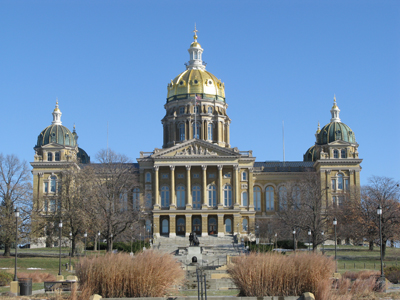2016 Legislative Priorities
posted
on Monday, January 11, 2016
 Welcome to the first day of the 2016 Iowa Legislative Session.
Welcome to the first day of the 2016 Iowa Legislative Session.
Last year, we saw modest but important environmental legislation, but there was no question that the much business was left unfinished!
This year’s session will certainly have its fair share of challenges, especially considering it’s a campaign year. However, frustrations with the state of our water, land and climate are palpable, and Iowans are looking to policy makers to act. We're ready to channel that energy into creating lasting change this session.
Our 2016 legislative priorities represent what we firmly believe to be significant opportunities this session to advance policies that make Iowa a better place the live, work and explore. The Council will also advocate for complimentary policies, and defend against those that threaten progress. Together, we can make significant strides to clean up our water, strengthen land stewardship and advance clean energy.
2016 Legislative Priorities
Clean Energy
- Expand, improve and maintain clean energy tax incentives
Improve access to clean energy by expanding, improving and maintaining clean energy tax incentives for farmers, businesses, residents, utilities, and communities to own or invest in their own wind turbines, solar panels or other forms of clean energy. Pursue expanding the amount of available funds, MW capacity and eligibility requirements. - Secure sufficient clean energy transmission infrastructure
Continue wind energy growth and development by ensuring sufficient high-voltage transmission infrastructure can be built to carry significant additions of wind power. - Protect distributed clean energy options
Continue solar energy growth and development by maintaining distributed clean energy options, such as net metering and third party power purchase agreements, and prevent new barriers to distributed renewables. - Reduce dependence on fossil fuels
Cut carbon pollution and reduce dependence on fossil fuels with policies that encourage a transition to clean energy.
Water & Land Stewardship
- Strengthen Iowa’s Nutrient Reduction Strategy
Improve accountability and effectiveness of Iowa’s Nutrient Reduction Strategy (INRS) by establishing a timeline with benchmarks for achieving the statewide pollution reduction goal, local reduction goals, consistent water quality testing and assessment, and sustained funding. - Fill the Natural Resources and Outdoor Recreation Trust Fund
Secure sustainable funding to conserve and improve water quality and natural resources in Iowa including agricultural soils, fish and wildlife habitat, parks and trails. Pursue funding the Trust with the original formula intact. The Council will not support the supplanting of existing program funding. - Fully fund the Resource Enhancement and Protection (REAP) program at $20 million
Support projects that benefit soil and water quality protection; parks, trails and wildlife areas, conservation in schools; historic resource protection; roadside beautification; and public land management. - Support a watershed framework for Iowa
Ensure sustained funding for implementation of a statewide watershed framework that includes watershed planning, implementation and assessment of all watersheds on a rolling cycle. Increase support for Watershed Management Authorities to provide local watershed planning. Pursue additional investments in complimentary conservation programs including technical and financial assistance with conservation planning at the farm level, and adequate funding for IDNR and IDALS.
These legislative priorities, as well as our overarching program priorities, may also be found on our website.
Stay in-the-know this session. Sign up to receive news and information about legislation and opportunities to make your voice heard when it matters most.
- clean energy
- healthy soil
- iowa legislature
- nitrate pollution
- phosphorus pollution
- solar power
- solar tax credits
- sustainable agriculture
- toxic algae
- water quality
- wind power
- wind tax credits